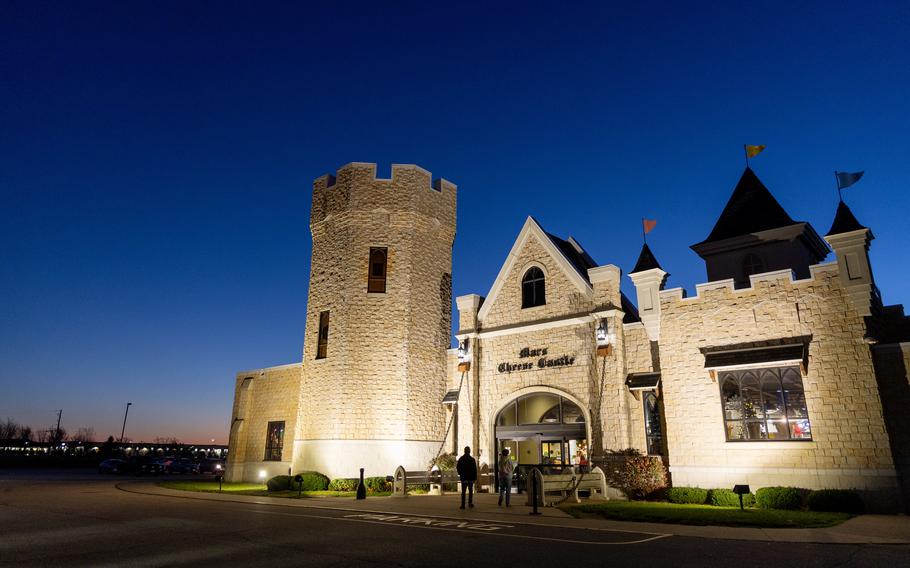
Located in Kenosha, Wis., Mars Cheese Castle is a 46,000-square-foot cheese (and sausage, souvenir, sandwich and liquor) store. (Kathleen Hinkel/For The Washington Post)
On a flat, straight stretch of Interstate 94 just north of the Illinois-Wisconsin border, a tan, turreted castle rises up against the horizon. Across the highway, there’s a Culver’s and a Dairy Queen and a bustling BP gas station, and down the frontage road sits a towing company’s squat garage. It’s a speed-through section of flyover country, but every day, hundreds of cars stop and signal. Mars Cheese Castle beckons.
Mars is the Upper Midwest’s most medieval — and perhaps most eye-catching — roadside attraction: a landmark, a specialty grocery store and a bar, all in one. It’s a 46,000-square-foot cheese (and sausage, souvenir, sandwich and liquor) store, where a shopper can pick up 15-year aged cheddar, gummy worms, a case of local beer and a polyurethane foam cheese hat in a single, rapturous trip. There are stained glass windows and two ornate thrones.
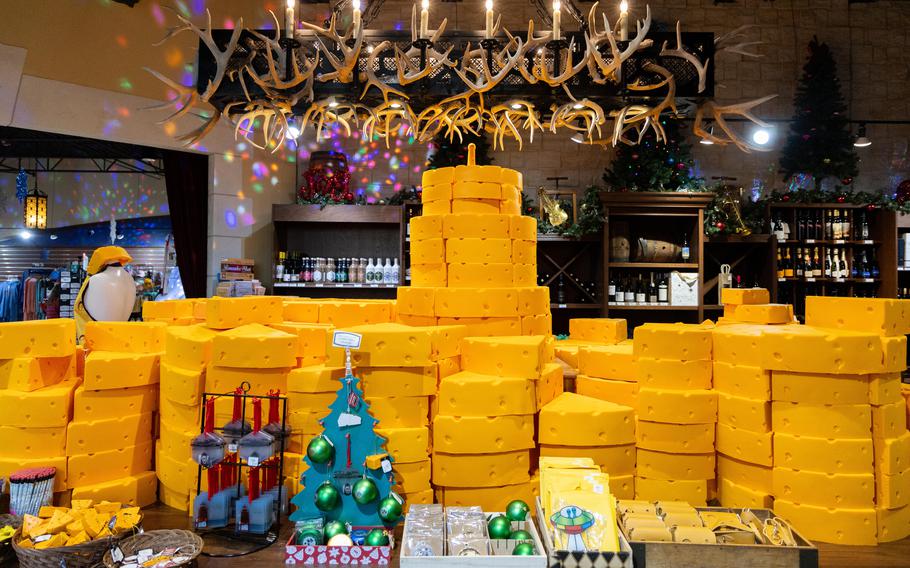
Souvenirs for sale at the Mars Cheese Castle include cheese hats. (Kathleen Hinkel/For The Washington Post)
“I think people don’t know what to expect when they come in,” said Natalie Broussard, the granddaughter of the Cheese Castle’s founders who now helps run the business. “Some people have heard, ‘You’ve got to have a bloody mary.’ Some people have heard, ‘You come in for a Reuben.’ And others see the billboard and just go, ‘What is that?’”
It’s a fair question. When it comes to America’s roadside curiosities, the Cheese Castle is hard to categorize. It’s as imposing as Minnesota’s Jolly Green Giant and the 50-ton Wall Drug dinosaur in South Dakota. It leaves travelers fed and watered and walking away with bags of treats they didn’t know they wanted, much like Buc-ee’s, Wawa and Sheetz, the convenience stores that have attracted regional fanaticism.
But Mars Cheese Castle isn’t an extravagant display or a corporate franchise. It’s a store that has become a symbol for all things Wisconsin.
1,000 pounds of cheese curds
Enter the Cheese Castle, and the first thing you’ll spot is likely to be a display of fresh curds, bagged, with several flavors to choose from. You’ll see full-size shopping carts, too, and perhaps a woman pushing one, sipping a light beer out of a plastic cup, deciding between several flavors of jams. Or a group of kids in paper crowns — picked up at the sandwich counter and colored over lunch — celebrating a birthday.
There are wooden cutting boards shaped like footballs and the state of Wisconsin, a full selection of candy, a funnel cake kit, pasta, relish, a mix for beer cheese soup, plush pigs, cows and sheep, clear plastic pouches screen-printed with the Bears’ and Packers’ logos, cult-favorite New Glarus beer, Christmas ornaments, T-shirts, tortilla chips, pastries, artisan sodas, bumper stickers and even Cheese Castle-branded wine. Some of the noncheese bestsellers include kringles — a European pastry that’s popular in Wisconsin — and brats, according to Broussard and her cousin, Michael Ventura, who’s also in management at Mars.
The place is a palace of gluttony, and that’s before you even consider the cheese, which is scattered throughout the castle’s several rooms but concentrated in one that’s equipped with coolers and a massive counter, where an employee hands out samples of anything to anyone who asks. (The bulk of Mars’ meat products are in this room, too.)
Almost everything is produced in Wisconsin, and the selection is ever-changing. Each week, Mars sells about 1,000 pounds of cheese curds, but there are plenty of less-conventional dairy products, too — like its unique spreadable cheddar and a chocolate cheese, which Broussard cites as a good reason for Mars’ liberal sampling policy. Road-trippers are going to come across things they’ve never seen before, and the best way for someone to wind up with an unexpected package of novelty lactose in their car is to let them take a bite midvisit.
“This can be a great thing or a bad thing,” joked Sandra Rivera, 43. Rivera and her sister were on a road trip in July 2023, visiting ballparks between her home in Philadelphia and Milwaukee. Heading north from Chicago, they spotted the Cheese Castle’s roadside sign, quickly Googled the name and exited the interstate.
“I walked into heaven,” Rivera said, and she sampled cheese after cheese, purchasing almost everything she tasted — along with bread, wine, cookies, spreads and jerky.
Run by locals, loved by visitors
On a Thursday afternoon in late October, I left Mars with cheese bread, a bag of fresh white-cheddar curds and a six-pack of Spotted Cow, the cult-favorite farmhouse ale only sold in Wisconsin. Then I hauled all of it to the rental car drop-off and onto the Chicago train, balanced precariously on my suitcase during rush hour.
Over the course of the weekend, I snacked on the sharp, salty curds like popcorn. The loaf of cheese bread, a Mars specialty, contained more than a quarter-pound of Wisconsin cheddar but wasn’t overly heavy and was great toasted. And I considered packing the leftover bottles of Spotted Cow in my suitcase for the flight home but decided against it.
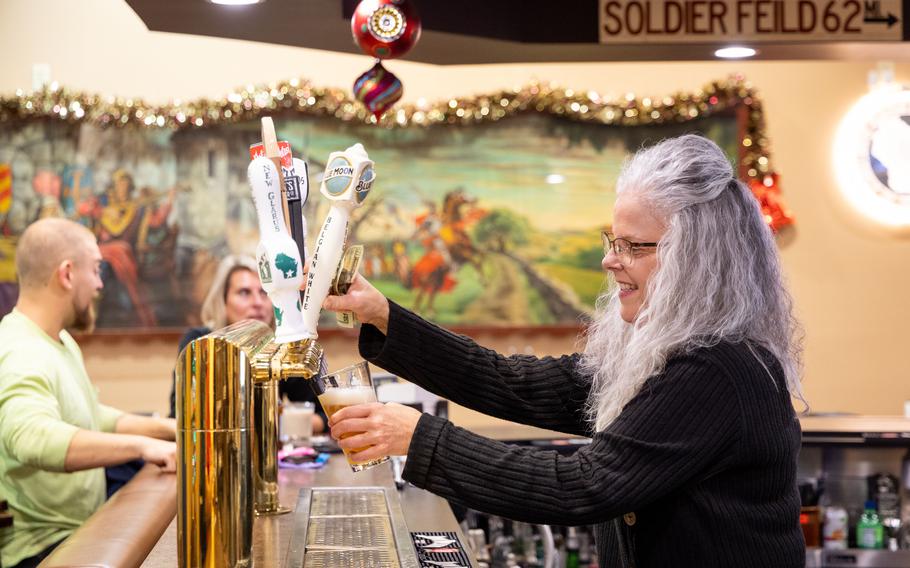
“I see new faces every day,” said Lisa Stefanic, 58, who has been bartending for 21 years at the tavern at the Mars Cheese Castle. (Kathleen Hinkel/For The Washington Post)
Like my haul, most of the food and drink and Wisconsin paraphernalia sold at the Cheese Castle is bound for far beyond Kenosha. Broussard and Ventura said locals make up only a small portion of their business. Broussard said she’s met people in Europe who are familiar with the Cheese Castle, but she knows plenty of Kenosha natives who have never visited.
Much of the traffic through the castle instead comes from Midwestern road-trippers, and in July, the flow of shoppers included a crew from CBS News who stopped during the Republican National Convention to poll voters about their confidence in the candidates.
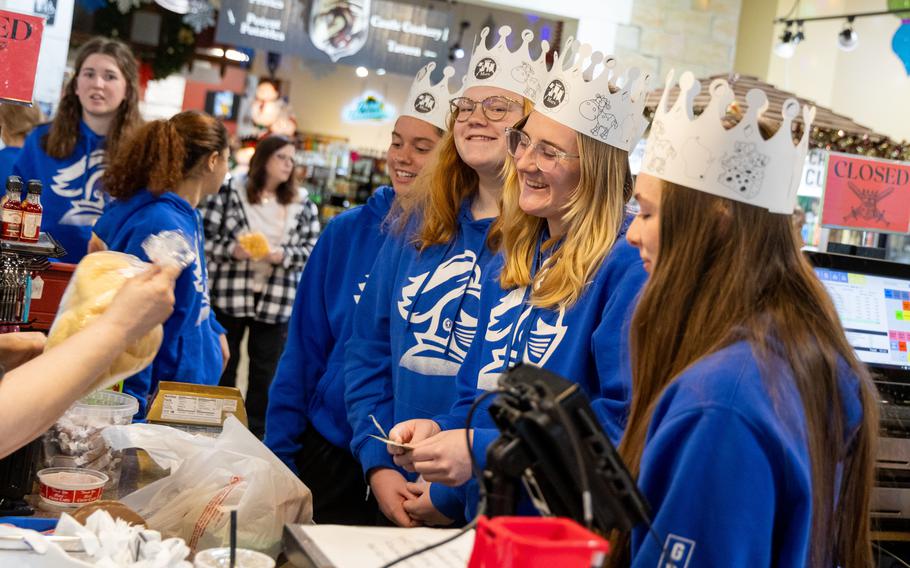
Members of the Great Lakes Christian College women’s volleyball team wear Mars Cheese Castle crowns as they check out on Nov. 7. They stopped while traveling on Interstate 94 from Michigan to play teams in Wisconsin. (Kathleen Hinkel/For The Washington Post)
But Mars hasn’t always drawn its business from beyond Kenosha. The Cheese Castle opened in 1947 as an inconspicuous shop situated near the intersection of two small state highways. Founders Mario and Martha Ventura called the business Mars because it sounded a bit like both of their first names. At first, they sold only cheese and sausage, mostly to locals.
Today’s castle is Mars’ third iteration. The first storefront burned in the late ’50s, and when rebuilt, the Venturas leaned into the castle branding. That building was white, with a stone trim and purplish-red decorative turrets affixed to the facade — distinctive enough to be a curiosity but discreet compared to the spectacle of today.
To understand how Mars came to look the way it does — and to attract so many travelers, and to sell so many flavors of cheese — you have to understand the interstate that runs alongside it.
How the Cheese Castle turned regal
When the interstate came to Wisconsin in the ’60s, the Venturas worried construction might doom their business. But a friend told Mario Ventura about California, where freeways dotted the landscape and roadside businesses thrived. Mario made a trip west to see for himself, and when he returned home, he vowed to hold out.
Within a few years, I-94 brought booming business along its path, and the Venturas diversified. They ran a gas station for a while and a motel, too. In the ’70s, Mars was doing so well that Mario Ventura made a quiet investment: He bought a parcel of farmland behind the store and did nothing with it.
His foresight paid off. In 2010, the Wisconsin Department of Transportation began the massive task of widening I-94, which required paving right over the Cheese Castle. Again, the family plotted to rebuild, this time on that vacant land. Business was booming, so adding space made sense, but the Venturas hadn’t considered how fully they could embrace their store’s wonky name.
The architect they hired did, though — pitching them on a palace with custom tan bricks inspired by the castles of Europe.
“We were like, ‘Ha ha, you know, that’s great,’” Michael Ventura said. “And I’m thinking to myself, like, ‘There’s only so much you can do. He’s kind of [talking] it up a bit.’ I thought it was a joke.”
But the family soon recognized that a true castle could turn even more heads in passing cars, and when the new castle opened in 2011, it also sparked headlines across the region. “Finally, the store befits its regal moniker,” the Chicago Tribune wrote.
These days, the castle is as striking as its 180-foot sign, which is technically taller than state law allows but was grandfathered in under a state budget provision. Before the rebuild, Phil Wehrmeister, a former Mars general manager, had referred to the sign as the store’s “lifeline to the road,” but these days, the rest of the operation matches its titanic scale.
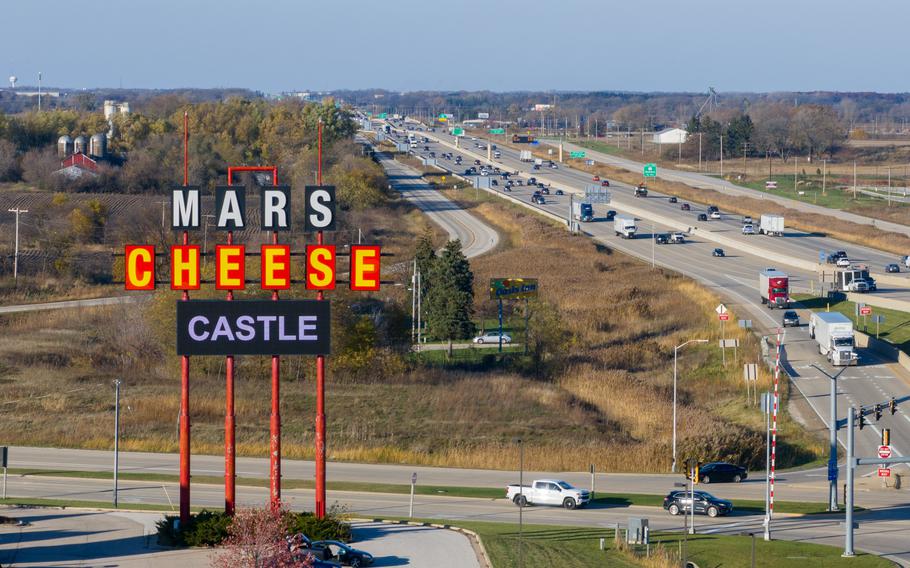
The Mars Cheese Castle sign in Kenosha, Wis., is a familiar sight for travelers driving on Interstate 94 through southeastern Wisconsin. (Kathleen Hinkel/For The Washington Post)
A few miles south, a “Welcome to Wisconsin” sign sits on a flat patch of grass, made all but obsolete by the behemoth up the road.
“Being in Kenosha, right across the border, we like to consider ourselves ambassadors,” Ventura said — ambassadors for their state and, Broussard added, for “the things that you can only get in Wisconsin.”